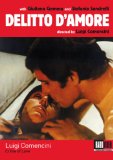| Reviews & Columns |
|
Reviews DVD TV on DVD Blu-ray 4K UHD International DVDs In Theaters Reviews by Studio Video Games Features Collector Series DVDs Easter Egg Database Interviews DVD Talk Radio Feature Articles Columns Anime Talk DVD Savant Horror DVDs The M.O.D. Squad Art House HD Talk Silent DVD
|
DVD Talk Forum |
|
|
| Resources |
|
DVD Price Search Customer Service #'s RCE Info Links |
|
Columns
|
|
|
Crime of Love
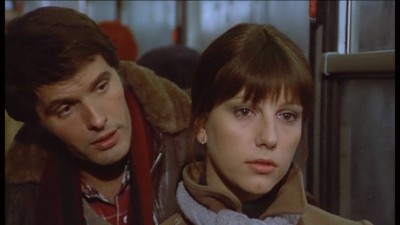
It turns out that Rainer Werner Fassbinder (Ali: Fear Eats the Soul) wasn't the only European filmmaker in the '70s who took his stylistic cues from '50s melodrama-meister Douglas Sirk (All That Heaven Allows) while subversively depicting his own society with a wary, critical, near-despairing eye. With the 1974 Italian film Crime of Love (Delitto d'amore), director Luigi Comencini made a similarly ambitious aesthetic move, relocating Sirk's brightly colored, heightened, compacted mode of storytelling to the contemporary lives of Milanese factory workers. In Comencini's self-described "fairy tale," both native Milanese and the more recently arrived Sicilian immigrants find their already tense, tumultuous situation of mutual suspicion and clashing cultures (there is evidently as much of a North-South divide in Italy as there is here in the States) distracts them, until it is tragically too late, from the corporate negligence and abuse that insidiously unite them in victimhood instead of solidarity.
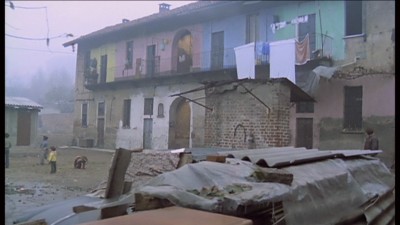
Nullo (Giuliano Gemma) and Carmella (Stefania Sandrelli), co-workers in a huge, grey, ultra-modern and ultra-impersonal, gender-segregated factory, come from different worlds in several respects. Geographically, Nullo is Milan born and bred, whereas Carmella has come with her family to flee their beloved but impoverished Sicilian village for Milan and its promise of the ability to at least earn a living wage. Class-wise, Nullo is a fairly reconstructed worker who comes from a Communist family and knows his rights, while Carmella is a displaced peasant, strong-willed and intelligent, but not savvy or enlightened enough to be alert to exploitation. Then there is the fact of Nullo being the (relatively) successful, property-owning son of his family, with whom he lives in a modern apartment he's purchasing, and of Carmella being a daughter and sister in a family that has brought its vehemently, sometimes violently patriarchal cultural ways with it. Their different classes are closely associated with yet another division between Nullo and Carmella, Nullo's lifelong default atheism vs. Carmella's near-constitutional Catholicism. How can the undeniable attraction and love between the two--sparked at the beginning of the film when Nullo consoles a distraught Carmella only to discover that her anguish has arisen from her feelings for him and his not knowing she's alive--flourish or even survive under such inhospitable conditions?
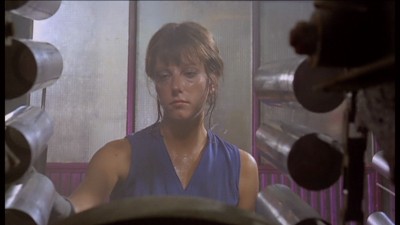
It's a classic Romeo and Juliet situation, but with the additional tragic burden of a negligent, inhumane system of insufficiently tempered capitalism, an oppressive force that these working-class Montagues and Capulets would be able to see they are facing together could they but cease their prejudicial, xenophobic, territorial squabbling long enough to notice it. It is this system that places Carmella in the path of constant occupational exposure to toxic pollutants, failing to protect her from them or even acknowledge their poisonousness. It is only after she becomes irretrievably ill that Nullo and Carmella's brother--the most virulent exponent of the anti-Northern, ultra-"traditional" Sicilian mores that insinuate themselves between Nullo/Carmella and peaceful conjugal bliss--realize that their issues, so hotly contested, are rather moot in the face of real matters of life and death. (Interestingly, it is Nullo's supposedly enlightened, politically right-on family that continues to harbor prejudice against Southerners and indifference toward Carmella even after she falls ill, while it is Carmella's "backward" family that begins to rethink their priorities and values after this harsh wake-up call.) If that makes the characters and their situations sound a bit too much like generalizations and symbols (of North and South, proletariat and peasant, urban and rural, etc.) in a too-tidy politicized diagram, it only rarely feels that way, in some of the film's occasional less sharp, more slipshod moments. Much more consistently, Comencini maintains the film's juicily emotional tone and heightened, romantic, not-quite-naturalistic melodramatic aura of conviction, with the invaluable backing of both Carlo Rustichelli's swooning score (pointing up the original "music+drama" meaning of melodrama) and the bold-color-on-gray visuals created by cinematographer Luigi Kuveiller and legendary production designer Dante Ferretti (who has contributed to everything from Salo to Casino).
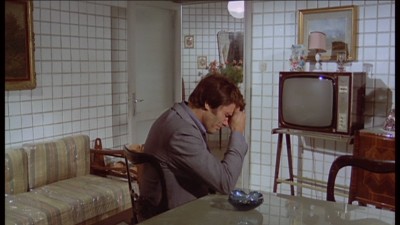
Time and again, from the aforementioned Sirk and Fassbinder works to more recent melodramatic heartbreakers like Far from Heaven and Brokeback Mountain, this way of telling a story has driven home the great potential effectiveness of foregrounding emotional pain and confusion the (economic, political) causes of which, unlike any of the characters whose fates and connections we're willingly seduced into caring about, are the film's true villains. Furthermore, it's an approach that makes it perfectly apparent that what might seem the very local meanings of this Italian film from the '70s work just as well as a continuingly relevant fable--one that is decidedly, disturbingly applicable to the United States at the end of 2011. It is difficult not to be reminded, when being transported, moved, and saddened by what befalls Crime of Love's characters, that a situation like theirs, wherein socioeconomically "lower" segments of a society are much too easily divided by religion, habits and "norms," and other cultural markers--and thereby distracted from more materially, substantially pressing concerns over crushing wealth/power inequalities--are never far from hand.
THE DVD:
There is some slight but noticeable flicker and dullness to the image throughout that suggest the transfer (presented anamorphically at an aspect ratio of 1.78:1) was made from less than pristine materials. None the less, the image is adequately clean, sharp, and vivid not to be a distraction from or intrusion into Kuveiller's bold, bright color-on-gray cinematography.
Sound:There are some limitations to the monaural soundtrack (in Italian with English subtitles), most notably in some distance and distortion, the latter most apparent in the ultra-emotive, near-operatic pop song that plays on the soundtrack at the film's beginning and end and, somewhat fittingly, becomes more than the speakers can bear at certain intense moments, spilling over into some distortion. Still, the sound is at least decent overall--about the level of quality you would get with a worn but acceptable print on the repertory circuit.
Extras:The principal bonus feature is an enriching 12-minute interview with film historian Adrian Apra, in which Apra gives a thumbnail overview of director Luigi Comencini's diverse filmography before narrowing in on Crime of Love to place and analyze it in the context of Comencini's other work. Also included is the film's theatrical trailer. In addition, RaroVideo has supplemented this release with a 20-page booklet whose contents include a director's statement from Comencini (along with an introductory word of praise from Dillinger is Dead director Marco Ferreri); assorted excerpts regarding the film from interviews with Comencini, both from around the film's release and over subsequent years; a diverse anthology of reviews, critiques, and analyses of the film; a word on the music by a musician who participated in the recording of Carlo Rustichelli's score; and Comencini's biography and filmography.
FINAL THOUGHTS:Hard as it might be to believe that an Italian melodrama from 1974 is rich with social, economic, and political situations that couldn't be more relatable for most American viewers at the present moment, Crime of Love is just that, telling, in literal and metaphorical primary colors, a heart-rending story of divided people who don't realize they have overriding interests in common until a breaking point is reached, which is much too late, at least for the characters we come to care about most deeply. If the film errs on the side of being a little too on the nose or having its characters stand too explicitly for too much, making them bear more symbolic significance than even a figure in a melodrama can be expected to shoulder, it does so only occasionally. Much more often, Crime of Love has us firmly in its emotionally overpowering grip, provoking us into empathy, compassion, and--most subtly, but most importantly--thought and reflection, involving us as it does in the lives of characters who don't deserve their fates, the particular cruelty of which we are devastated by because the film lets us see quite clearly that they only seem inevitable. Recommended.
|
| Popular Reviews |
| Sponsored Links |
|
|
| Sponsored Links |
|
|
| Release List | Reviews | Shop | Newsletter | Forum | DVD Giveaways | Blu-Ray | Advertise |
|
Copyright 2024 DVDTalk.com All Rights Reserved. Legal Info, Privacy Policy, Terms of Use,
Manage Preferences,
Your Privacy Choices | |||||||









